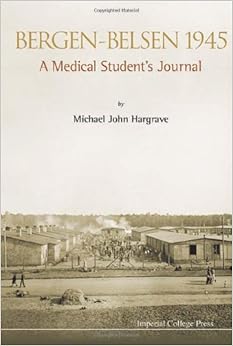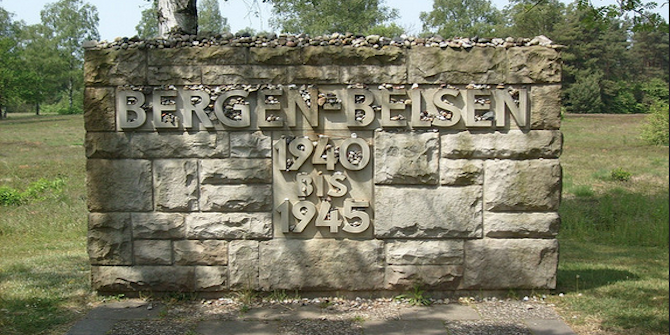
Twenty-one year old medical student, Michael Hargrave, was sent to Bergen-Belsen in 1945, only two weeks after it was liberated. This firsthand account details Michael’s month-long experience at the camp. He relates the horrendous living conditions suffered by the prisoners, describing the sickness and disease he encountered and his desperate, often fruitless, struggle to save as many lives as possible. Reviewed by Alex Mayhew.
Bergen-Belsen 1945: A Medical Student’s Journal. Michael John Hargrave. Imperial College Press. 2015.
The archives of the Imperial War Museum house innumerable letters, diaries and memoirs. Exposure to primary material can illuminate Britain’s Twentieth Century war experience with a directness that is absent in secondary literature. Unfortunately recent reports suggest that Britain’s preeminent public museum of war may begin to charge up to £14 a day for use of its archives. This would be harmful to already under-funded researchers and their work. Not to mention that it would set a dangerous precedent for other establishments, as it violates the legacy of the donors who left their records for the purpose of public consumption. On the 70th anniversary of the British liberation of Bergen-Belsen, Imperial College Press’ publication of Michael John Hargrave’s journal, charting his experiences as a young medical student at the camp, reveals the breadth and importance of an archival source that might soon be accessible only to those with the funds to support their historical interests.
At first glance, Hargrave’s objective style might be mistaken for lack of emotion. However, it reveals to the reader the internal struggle of a young man endeavouring to be “professional”. At twenty-one, he is thrown into an alien world and he is forced to rationalise his place within it. As a doctor, the physical trauma that pervaded the camp was something to be viewed with a clinical eye. Furthermore, he wrote the record for his mother. It was always going to be written in a certain tone and, of course, this does not mean that he was not reacting emotionally. Objective statements are capable of giving an insight into wider issues of historical interest. Perhaps Hargrave’s professional attitude, striving to do ‘a good days work,’ (p 31) provided some protection again the horror of the camp.
Much of Bergen-Belsen’s utility as a historical source comes from the detail that is included in its author’s day-by-day narrative of the liberation and its medical complications. Its utility as a narrative in these regards is evident in Ben Shephard’s monograph After Daybreak: The Liberation of Belsen 1945, which used the diary extensively. However, Hargrave’s drive to describe everything he sees, in turn, gives a permanency to his experiences which provides us with an account that supplies more than a simple insight into the liberation of one camp. There are more nuanced points of interest, which are worth dwelling upon.

The journal is not entirely lacking in sentiment. The narrative is permeated with brief glimpses into the author’s emotional state. In particular, references to German soldiers and civilians can certainly be read with varying degrees of bitterness and anger. Hargrave reports, with satisfaction, of the German prisoners-of-war that were forced to do ‘death squad’ duty, which involved burying the deceased internees (p 23). He also describes, with a degree of sourness, that the Germans civilians he encounters seemed to be ‘laughing and happy’ and demonstrated negativity only when faced by British soldiers (p 82). Similarly, he is derisive of German soldiers describing them as ‘sheep’ for the way they acted towards their British captors (p 43). There is certainly a degree of revulsion where he mentions German actions, particularly with reference to the S.S. guards’ lack of shame over their actions (p 44). However, it is not immediately clear whether his reactions are primarily humanitarian or indicative of a sense of British moral superiority.
There is a sense that the liberation and subsequent medical operation at Bergen-Belsen is seen to confirm the justice of the British and Allied cause against Nazi Germany. This is encompassed by Brigadier Glynn Hughes’ speech on the destruction of the final hut in the camp. He reminded the crowd ‘the British flag did not stand to bestiality or cruelty and that was why the Union Jack had never flown over Belsen Camp’ (pp 69-70). While the inhumanity of the Germans is underlined, there is a sense that perhaps this moment is being used as positive propaganda. Hargrave does demonstrate a pride in the work that he had completed, particularly when he is certain he has saved someone’s life (p 68). Yet, this seems to be largely a professional reaction rather than an expression of human empathy.
Indeed there are instances that seem to reflect the limits of compassion. It becomes increasingly clear towards the end of his time at Bergen-Belsen, that Michael and his colleagues were becoming progressively frustrated with the internees. This seems to be the product of revulsion at the prisoners’ lack of cleanliness, their apparent lack of gratitude and their increasing boredom (pp 54, 58-59, 77). The fact that a British soldier, previously a prisoner of the Germans, is brought into to try and explain the psychological impact of internment and the outlook of internees, suggests that the authorities saw a need to educate these young men regarding the depth of trauma endured (p 35).
This might, then, be a tale of two irreconcilable perspectives – Michael found it difficult to understand the disturbances his patients had undergone. However, his vivid descriptions remain a telling insight into the psychological implications of the Holocaust. His first depiction of those inmates that he encounters reveals the depth of despondency engendered by their experiences. He explains how the victims ‘looked thin, brown and dirty’ shuffling ‘in a purposeless sort of way… They were not the least interested in anything’ (p 17). This vision of hopelessness, perhaps the consequence of such a tormented experience, is matched in brief illusions to their desperate attempt to protect their humanity. Hargrave inadvertently portrays examples of a material culture that rests on very little. He recalls that his patients, whom were crowded on a floor covered in faeces and urine, would protectively hoard bread or tin mugs. (p 19). This attempt to assert ownership in the face of horror leaves one with a sense of awe at the human capacity for endurance.
However, this is tempered by an inability to see beyond a short time horizon. Hargrave notes, towards the end of his service, that while provisions and new clothes had left many women in Camp I with their self-respect back,’ many internees were still living by the ‘law of the clutching hand’ (p 76). While his comments are symptomatic of his frustrations in his final days at Bergen-Belsen, they suggest that the emotional consequences of the people’s time living under the murderous thumb of Nazism had left lasting scars. Research has shown that human decision-making and perspective is constrained and influenced by our environment. These victims’ appreciation of life and the world seems to have been dictated by the reality of four-walls and barbed wire, within which death stalked every day.
Hargrave’s account insists that we must continue to read and learn from past conflict and highlights the importance of the IWM’s collections. The proceeds of this publication go to Rotary International’s PolioPlus programme and Amnesty International. Yet, while encouraging the public to buy this book, I hope that my discussion reveals Bergen-Belsen: A Medical Student’s Journal to be an example of an archive that should continue to be publically accessible without financial impediment. If not, I fear that we are encouraging a swathe of history to become the domain of the elite and fee-paying members of future generations.
Please read our comments policy before commenting.
Note: This article gives the views of the author, and not the position of EUROPP – European Politics and Policy, nor of the London School of Economics.
Shortened URL for this post: http://bit.ly/1GuMFoZ
_________________________________
Alex Mayhew – LSE
Alex Mayhew is a PhD student in the Department of International History at the London School of Economics. He gained a BA from King’s College London, where he won the Brewer Prize for Modern History in 2013 His research focusses on the contingencies of English military morale and soldiers’ culture in the First World War. He also maintains an interest in issues of historical memory and conflict more generally.


